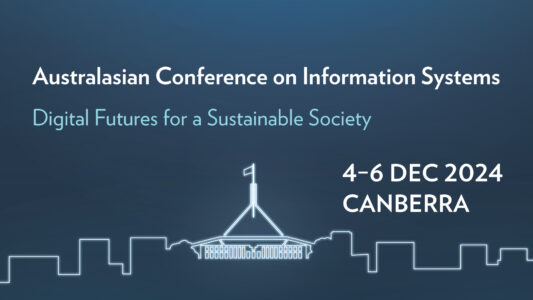The Australasian Conference on Information Systems (ACIS 2024) was hosted by the University of Canberra in Canberra, the capital of Australia, from 4 December to 6 December 2024. In its 35th year, the Australasian Conference on Information Systems is the premier conference on the Information Systems discipline in the Australasian region.
Digital Futures for a Sustainable Society
Building digital futures for a sustainable society involves utilizing technology to address environmental, social, and economic challenges while ensuring that the benefits are inclusive and equitable. As technology advances and organizations transform, the need to integrate sustainability principles into digital practices is even more critical. Technologies for the future need to be built according to regenerative designs to improve economic resilience, foster digital sovereignty, and achieve social equity.
By combining digital solutions with sustainable practices, societies can work towards a more resilient, effective, and inclusive future. It is crucial to prioritize ethical considerations, regenerative principles, data privacy, and security to ensure that the implementation of digital technologies aligns with sustainability principles.
The Australasian Conference on Information Systems (ACIS 2024) was hosted in Canberra, the capital of Australia, from 4 December to 6 December 2024. Canberra, which means “the meeting place” in the local Ngunnawal language, is one of the world’s most sustainable cities. Attendees from around the globe came together in Canberra to share research insights and perspectives about how digital technologies can promote sustainability and facilitate a resilient economy that works for the common good.
Submissions from 2024
Under Construction: How Organisational Stakeholders Socially Produce Algorithmic Fairness, Stefanie Knippschild, Sebastian Boell, Kai Riemer, and Sandra Peter
Transforming Education: A Modern AI-driven Approach for Enhancing Student Engagement in Higher Education, Malni Kumarathunga
Integrating Drone Technology into Healthcare Logistics: Optimizing Blood Bag Delivery with a Mixed-Integer Linear Programming and Block-Stacking Heuristic Approach, Tejinder Singh Lakhwani, Yerasani Sinjana, and Anuj Pal Kapoor
Use of Affordance in Design Science Research: A Systematic Literature Review and Research Agenda, Sanjay Lama and Sojen Pradhan
Influencing Factors and Strategic Archetypes of Citizen Development: A Systematic Literature Review, Stephan Leible, Gian-Luca Gücük, and Dejan Simic
Combatting Misinformation in Decentralised Social Media: Understanding User Engagement and Incentives, Jana Lekscha, Julian Marx, and Milad Mirbabaie
Analysing the Reach of Debunking Posts on Twitter, Jana Lekscha, Jonas Rieskamp, and Milad Mirbabaie
Towards a Conceptualisation of Corporate Digital Responsibility: Assessing the current literature, T. N. Nhung Le, Allan Sylvester, and Jennifer Campbell-Meier
Designing a Sustainability Artificial Intelligence System for Carbon Stock Estimation: A Design Science Research, Amelia S. Li, Shan L. Pan, Yenni Tim, and Hoang D. Nguyen
Integrating Human Systems with Digital Innovations in the Resources Sector, Eden Li and Laurie Hughes
Exploring Generative Artificial Intelligence Affordances: Insights from Australian Healthcare Organisations, Mingye Li, Yaoxin Xie, Vei Yie Tan, and Zeng Li
Mental Health Service Utilisation in New Zealand: Exploring Disparities and Inequities among Marginalised Indigenous Groups, Peng Li, Aakanksha Aakanksha, and David Sundaram
Experiments in the Design of Effective Visualizations to Enhance Decision-making and Mitigate Cognitive Bias, Bingxin Liu, Kevin Dow, Christopher Akroyd, and David Sundaram
Evaluating the Strategic Importance of Procured Products in the Manufacturing Sector: A Stratified MCDM Approach with Clustering, Fei Liu, Hamed Jafarzadeh, and Mehdi Rajabi Asadabadi
A Process Model for Metaverse Development, Jiongbin Liu, William Yeoh, Shang Gao, and Ofir Turel
Powering Food Security via Geographic Information System: a Perspective of Innovation Readiness, Ye Li, Yunfei Shi, Dongming Xu, and Cong Qi
Journeying Alongside Generative AI: Integrating Perspectives from Vicarious Learning and Cognitive Load Theory, Louis Lo, Jui-Min Li, and Chun-Hui Wu
The Intersection of GenAI and Immersive Systems: Towards a Responsible Generative Metaverse, Kevin Luo, Michael Cahalane, and Sandeep Mysore Seshadrinath
An Organisational Learning Framework for Preventive Strategies to Mitigate Cybersecurity Challenges in Higher Education During Major Crises, Samreen Mahmood, Mehmood Chadhar, and Selena Firmin
On Enabling Dynamic, Transparent, and Inclusive Government Consultative Processes with GenAIOpenGov DSS, Olivera Marjanovic, Diana Hristova, Saswat Dash, and Babak Abedin
The Role of “Dark" Social Media in Crisis Management: A Scoping Review, Julian Marx, Rashika Bahl, and Juliana Sutanto
The concept of company-specific ontology for information integration: literature review and demonstration in a case study, Simon Meier and Petra Schubert
Understanding the Privacy Implications of Smart Homes: Increasing Children’s Privacy Literacy around IoT Data Collection, Troy Merritt, Zi Siang See, Kristy De Salas, and Erin Roehrer
Artificial Intelligence System Development: Common Enabling Themes from Case Studies, Sahber Monshizada, Hamed Sarbazhosseini, and Masoud Mohammadian
Effective Stereotypical Bias Detection: The Impact of Human-AI Collaboration Modes on Human Reliance on AI Recommendation, Danlei Mou, Tingru Cui, Katja Holtta-Otto, Bo Du, and Jiawei Tong


